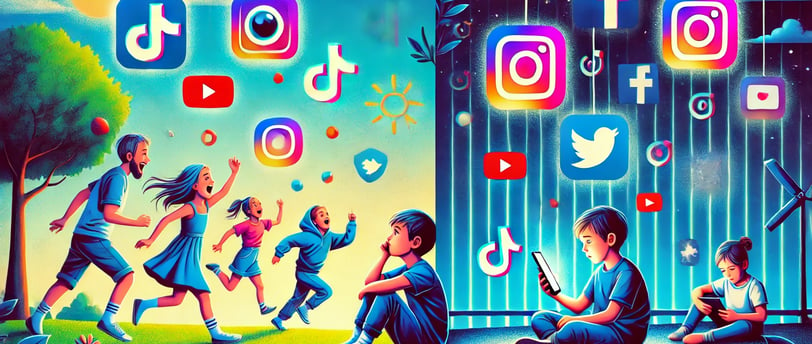How Technology Shapes Childhood Today
Childhood is not the same anymore. Think back to the days when entertainment meant climbing trees, playing hide and seek or simply making up games out of nothing. Now, take a look at kids today- they are growing up in a completely different world, where screens dominate their daily lives. Technology has changed childhood in a way that is both fascinating and sometimes a little worrying.


A Walk Down Memory Lane: Then vs. Now
If you grew up before the digital explosion, you probably remember a slower, simpler pace of life. Your "screen time" was limited to the occasional Saturday morning cartoon or movie with the family. Compare that to today, where tablets, smartphones, and video games are as common as toys used to be.
Children today have access to things we could never have imagined—instant answers to their questions, virtual worlds where they can play with friends across the globe, and educational tools that make learning fun. But all of this comes at a price. Uncontrolled screen time often replaces outdoor play, face-to-face interactions, and natural relaxation that fosters creativity.
The Bright Side of Technology
Let’s be clear: technology isn’t all bad. In fact, when used wisely, it can boost your child’s development and education in incredible ways:
Learning made fun: Kids can explore topics that fascinate them — dinosaurs, outer space, history, or music — through interactive apps, videos, and games. Who knew learning fractions could involve colorful pizza on a screen?
Get creative: From designing their own video games to creating digital art or making short films, technology gives kids the tools to express themselves in ways that weren’t possible before.
Building relationships: Whether it’s Face Timing grandparents or collaborating on school projects online with friends, technology helps kids stay connected even when they’re far away.
The Challenges We Can’t Ignore
While technology opens doors, it also creates challenges that can’t be ignored:
Less playing, more sitting: Hours spent on screens often mean fewer hours of moving around outside. Physical activity, which is essential for healthy development, takes a backseat.
Mental health matters: Social media in particular can affect children’s self-esteem. The constant stream of “perfect” photos and lives can make them feel like they’re not good enough.
Social skills at stake: Real-life interactions—like making eye contact or resolving disagreements—are essential life skills. Spending too much time online can make it difficult for children to develop these skills.
Addiction concerns: Many games and apps are designed to keep kids coming back. It’s easy for them to spend “just five more minutes” until hours have passed.
Finding the Middle Ground
Here's the good news: technology doesn't have to be the enemy. The goal isn't to eliminate screens altogether (let's be honest, that's not realistic!). Instead, it's about balance. By understanding how technology affects your child and making conscious choices, you can lead them to a healthier relationship with it.
Technology can be a fantastic tool for development when used thoughtfully. It's about giving your kids the best of both worlds — encouraging them to explore what technology has to offer and making sure they don't lose touch with the real world around them.
Discover
Blogs to enhance your knowledge and curiosity.
Explore
Learn
info@learnerbuzz.com
© 2024. All rights reserved.
Terms & Conditions
